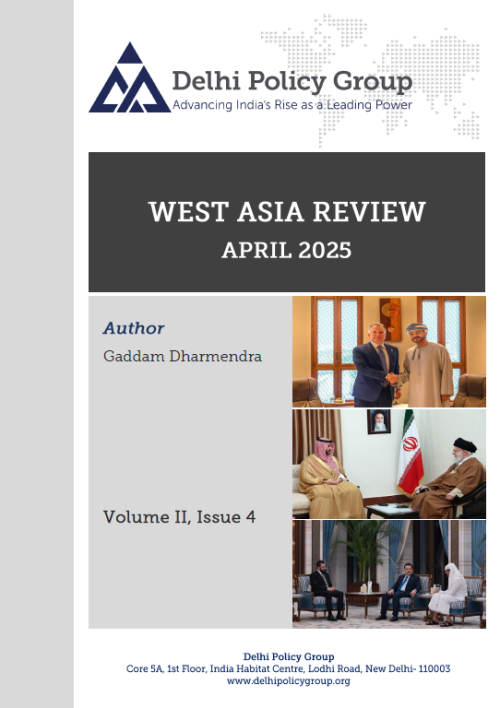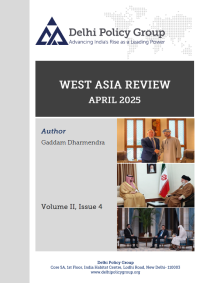West Asia Review
Date: May 07, 2025
Regional diplomacy in West Asia and the Levant remained in high gear during the month, with the centrepiece being indirect talks between the US and Iran mediated by Oman. President Trump reiterated that he prefers a nuclear deal with Iran over any military action, even as his two-month deadline to conclude discussions loomed. The E3 (France, Germany and the UK) and the IAEA were excluded from the talks. There were signs of some differences within the US administration regarding Iran’s right to enrichment. The US-Iran talks due at the end of April were indefinitely postponed.
Prime Minister Narendra Modi had to cut short an otherwise successful visit to Riyadh on April 22, following the deadly terror attack against civilians in Pahalgam, in India’s Jammu and Kashmir. PM Modi also spoke to the leaders of Jordan, Egypt and Iran following the terror attack.
Saudi Arabia’s Defence Minister, Prince Khaled bin Salman, visited Tehran on April 17, marking the first high level visit from the Saudis to Iran in over two decades. He delivered a message from Saudi King Salman to Ayatollah Khamenei, and engaged with several senior Iranian counterparts.
The Syrian regime of interim President al-Sharaa continued to struggle with sectarian violence in the country. Iraq and Syria held their first meeting since the fall of the Assad regime in Doha, with the Qatari Emir bringing the two sides together to discuss regional security and counter terrorism.
The US Treasury imposed (April 29) another round of sanctions on Iran and China over the procurement of ballistic missiles propellant ingredients on behalf of Iran’s Revolutionary Guard (IRGC). Prior to this, on April 26, a massive explosion caused extensive damage and left scores of people dead at the port of Bandar Abbas. Despite IRGC denials, reports indicated that the explosion was caused by the improper handling of sodium perchlorate, which is a highly explosive chemical and was exported from China.
The US continued to bomb Houthi positions in Yemen, while the Saudis also launched a series of bombing raids in the Saada region of Yemen.
These, and other major developments in West Asia, are covered in this April issue of the West Asia Review.
To read this West Asia Review, Vol. II, Issue 4, please see the PDF attached.
Prime Minister Narendra Modi had to cut short an otherwise successful visit to Riyadh on April 22, following the deadly terror attack against civilians in Pahalgam, in India’s Jammu and Kashmir. PM Modi also spoke to the leaders of Jordan, Egypt and Iran following the terror attack.
Saudi Arabia’s Defence Minister, Prince Khaled bin Salman, visited Tehran on April 17, marking the first high level visit from the Saudis to Iran in over two decades. He delivered a message from Saudi King Salman to Ayatollah Khamenei, and engaged with several senior Iranian counterparts.
The Syrian regime of interim President al-Sharaa continued to struggle with sectarian violence in the country. Iraq and Syria held their first meeting since the fall of the Assad regime in Doha, with the Qatari Emir bringing the two sides together to discuss regional security and counter terrorism.
The US Treasury imposed (April 29) another round of sanctions on Iran and China over the procurement of ballistic missiles propellant ingredients on behalf of Iran’s Revolutionary Guard (IRGC). Prior to this, on April 26, a massive explosion caused extensive damage and left scores of people dead at the port of Bandar Abbas. Despite IRGC denials, reports indicated that the explosion was caused by the improper handling of sodium perchlorate, which is a highly explosive chemical and was exported from China.
The US continued to bomb Houthi positions in Yemen, while the Saudis also launched a series of bombing raids in the Saada region of Yemen.
These, and other major developments in West Asia, are covered in this April issue of the West Asia Review.
To read this West Asia Review, Vol. II, Issue 4, please see the PDF attached.



